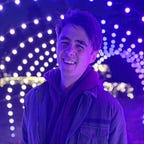1. Anxieties (JW)
San Francisco, USA
Dear Hana,
I spent much of the final two weeks of 2019 in a box traveling at high speeds, with only a common human aversion to death preventing catastrophe from unfolding at each turn. Put less obscurely, I was driving myself from San Francisco to Tucson, Arizona to join some friends and their families for Christmas.
Why drive instead of fly? Well, frankly, I’m more than a little tired of being afraid.
I received my first driver’s license over a decade ago when we both still lived in childhood homes in Ottawa, but most of the years since I’ve driven a grand total of zero times.
Regardless of the infrequent necessity to drive in my life, I’m increasingly aware of how anxieties affect my self-perception. When on a road trip, an exhausted friend may turn to me and say “Hey, I’m exhausted — could you take over driving for a bit, Jamie?” to which I would inevitably respond something like “I do have a license, but I haven’t driven in a long time, and I’m not super comfortable, but if you really want…” and by the time I was finished prevaricating, they would invariably hand the keys to someone else. I would invariably feel very small.
So, as a confidence building journey, I set off solo from San Francisco in a 2019 Ford Fusion from the Civic Center Enterprise Rent-a-Car. Surprisingly, I found myself afflicted more by sleepiness than heart-choking anxiety. If my eyes felt particularly adamant about their desire to close, I would pull out the big anti-sleep guns and sing along with Hamilton, but mostly I listened to audiobooks. The book I feel most compelled to discuss is “The Omnivore’s Dilemma” by Michael Pollan.
The introduction of the book is entitled “Our National Eating Disorder”, a term which Pollan uses to describe some of the idiosyncrasies of the American strategy of eating. In describing the call-to-arms against high fat diets and subsequent rush to blame simple carbohydrates instead, Pollan says:
Certainly it would never have happened in a culture in possession of deeply rooted traditions surrounding food and eating. […] A country with a stable culture of food would not shell out millions for the quackery (or common sense) of a new diet book every January. It would not be susceptible to the pendulum swings of food scares or fads, to the apotheosis every few years of one newly discovered nutrient and the demonization of another. It would not be apt to confuse protein bars or food supplements with meals or breakfast cereals with medicines. It probably would not eat a fifth of its meals in cars or feed fully a third of its children at a fast-food outlet every day. And it surely would not be nearly so fat.
I must admit that I listened to part of this book while munching on a protein bar in the car.
The book on the whole is fascinating, but one specific chapter provided the alertness I needed to drive the last few hour return leg from Los Angeles to San Francisco: Chapter 17, The Ethics of Eating Animals.
While sitting in a steakhouse, Pollan began reading Peter Singer’s book “Animal Liberation: A New Ethics for Our Treatment of Animals“. Pollan, a lifelong omnivore, details his rising discomfort at seeing his counterarguments to Singer’s systemically dismantled. This culminates in Pollan seeing no honest way around at least attempting to be vegetarian. He felt a need to understand what he would truly be giving up. Only then could he weigh that sacrifice against the weight of the animal suffering he induces by sitting on the demand side of meat.
One month in, he had this to say:
What troubles me most about my vegetarianism is the subtle way it alienates me from other people and, odd as this might sound, from a whole dimension of human experience. […] Other people now have to accommodate me, and I find this uncomfortable: My new dietary restrictions throw a big wrench into the basic host-guest relationship. As a guest, if I neglect to tell my host in advance that I don’t eat meat, she feels bad, and if I do tell her, she’ll make something special for me, in which case I’ll feel bad. On this matter I’m inclined to agree with the French, who gaze upon any personal dietary prohibition as bad manners.
Having spent most of my own life as a vegetarian, this facet of alienation is something I think about a lot. It’s hard to articulate the ways in which not sharing food creates distance where you wish there was none, both with friends, and with entire cultures while traveling. That’s why meat is another recurring source of anxiety in my life, and unfortunately offers more moral complexity to wrestle with than my (now mostly resolved) worries behind the wheel.
Whenever anyone asks me why I’m vegetarian, I vary the length of my answer depending on the occasion. The short version I offer is that I wouldn’t be comfortable, knife in hand, ending an animal’s life to make my meal, so I don’t think I should partake. That said, I’ve realized that the majority of my omnivorous friends also aren’t comfortable doing this. They’ve just been sufficiently conditioned to decouple the act of the knife in the slaughterhouse from the act of the knife on the plate.
Pollan felt the need to gaze at the world from the other side of the vegetarian/omnivore fence in order to truly understand where he stands. I wonder if I might too. Wherever I end up, I would love an anxious relationship to food to be a memory rather than a regularly scheduled event.
I hope your stay in Vienna is agreeing with your stomach and soul, and that your shoes are making frequent contact with the decidedly more pedestrian friendly streets.
Your over-thinking friend,
Jamie
